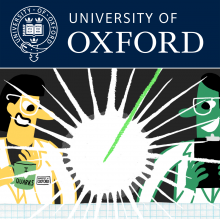
Relevant Links
Check out our animations about the cutting-edge research taking place at the University of Oxford. From a quick look around the LHC and an underwater adventure to explore the insides of a volcano, to finding out what makes us tick and how we're developing new technology to build quantum computers using light.
Subscribe:
| # | Episode Title | Description | People | Date | |
|---|---|---|---|---|---|
| 15 | Power People: what are we doing with all that energy? | Did you know that you are in charge of a power station? It's true. Every time you flick a light switch, a power station somewhere in the UK will respond and generate that little bit of extra power you need for your light. | Phil Grunewald | 05 May 2016 | |
| 14 | Run for Your Light | You may have heard the word “quantum” bandied around a lot. But what does it mean? In this animation we take a look at how the photon – the quantum particle of light – is being harnessed to help create new technologies like quantum computers. | Robert Taylor, Steven Kolthammer, Josh Nunn | 12 Apr 2016 | |
| 13 | What Makes You Tick? | How do you know when it's time to wake up or go to sleep? More powerful than any alarm are your circadian rhythms. | Christopher James-Harvey, Stuart Peirson, Russell Foster | 12 Apr 2016 | |
| 12 | Shedding Light on the Situation | Light is more than just light bulbs and sunshine! Researchers at the University of Oxford use different types of light to learn more about all sorts of interesting things. | Jena Meinecke, Chris Rennick, Brianna Heazlewood, Clarence Yapp | 12 Apr 2016 | |
| 11 | Give us a hand | Oxford Sparks explore what chirality is. | Jo Dunkley, Alain Goriely, Robert Llewellyn | 18 May 2015 | |
| 10 | You've Got a Nerve | In the early 1900s, Charles Sherrington examined microscope slides of muscles, nerves, the spine and the brain and traced the connections between them building a picture of how muscles are controlled. Researchers today still use principles he established. | Jo Dunkley, Robert Llewellyn | 05 Mar 2015 | |
| 9 | Give Peas a Chance | Nitrogen could be one of the most interesting elements in the periodic table. Find out more about this fascinating element and how research into peas and beans at Oxford could help feed the world! www.oxfordsparks.net/nitrogen. | Jo Dunkley, Robert Llewellyn | 05 Mar 2015 | |
| 8 | A Case of Crystal Clarity | Oxford Sparks presents an adventure in X-ray crystallography. Find out more and read about the science behind the animation at www.oxfordsparks.net/crystal. | Mel Giedroyc | 05 Mar 2015 | |
| 7 | Jet Plight | Take a journey through a jet engine with Ossie from Oxford Sparks. Find out more and read about the science behind the animation at www.oxfordsparks.net/jet. | Elliott Webb | 05 Mar 2015 | |
| 6 | A spin around the brain | Take a journey around the brain with Ossie from Oxford Sparks. Find out more and read about the science behind the animation at www.oxfordsparks.net/mri. | Ruby Wax | 05 Mar 2015 | |
| 5 | A quick look around the Large Hadron Collider | Oxford Sparks presents a visit to the Large Hadron Collider at CERN in Geneva. Find out more and explore other LHC resources at www.oxfordsparks.net/animations/lhc No protons were harmed in the making of this animation. | Alan Barr | 15 Apr 2013 | |
| 4 | Towards absolute zero - a low temperature journey | Oxford sparks presents a ride to the land of the extremely cold. Find out more, and read the science behind the animation at www.oxfordsparks.net/animations/coldchem. | Tim Softley | 15 Apr 2013 | |
| 3 | Another case of heart trouble | Oxford Sparks presents a look at how a single change in DNA can cause the human heart to go wrong. Find out more and read about the science behind the animation at www.oxfordsparks.net/animations/heart. | Hugh Watkins, Anna Michell | 15 Apr 2013 | |
| 2 | Underwater volcano disaster | Oxford Sparks presents a visit to the Stromboli volcano. Find out more and explore other volcano resources at www.oxfordsparks.net/animations/volcano. | David Pyle | 15 Apr 2013 | |
| 1 | Rogue planet | Oxford Sparks presents a journey around the planets. Find out more and read about the science behind the animation at www.oxfordsparks.net/planet. | Chris Lintott | 15 Apr 2013 |
